Essay: Citizenship, Community, and Welfare in UK Education System
VerifiedAdded on 2023/06/10
|10
|3032
|444
Essay
AI Summary
This essay provides an in-depth analysis of citizenship, community, and welfare within the context of the UK education system. It explores the significance of education for national development, emphasizing its role in providing knowledge, promoting social standards, and fostering economic growth. The essay examines the barriers and challenges related to education, welfare, and citizenship, particularly focusing on the impact of government policies and social welfare programs on vulnerable communities. It discusses the evolution of education reform in the UK, including the introduction of market mechanisms and the national curriculum. The essay highlights the Department of Education's role in delivering educational welfare services and the impact of citizenship on accessing welfare benefits. It also delves into the concept of social citizenship, the different classes of citizenship in the UK, and the components of a welfare state, such as reciprocity, inclusion, and trust, in relation to education. The analysis underscores the importance of addressing funding shortages and staff shortages to improve education quality, especially for vulnerable groups, and the role of education in breaking cycles of poverty. Finally, it provides a comprehensive understanding of how the UK's education system supports its citizens.
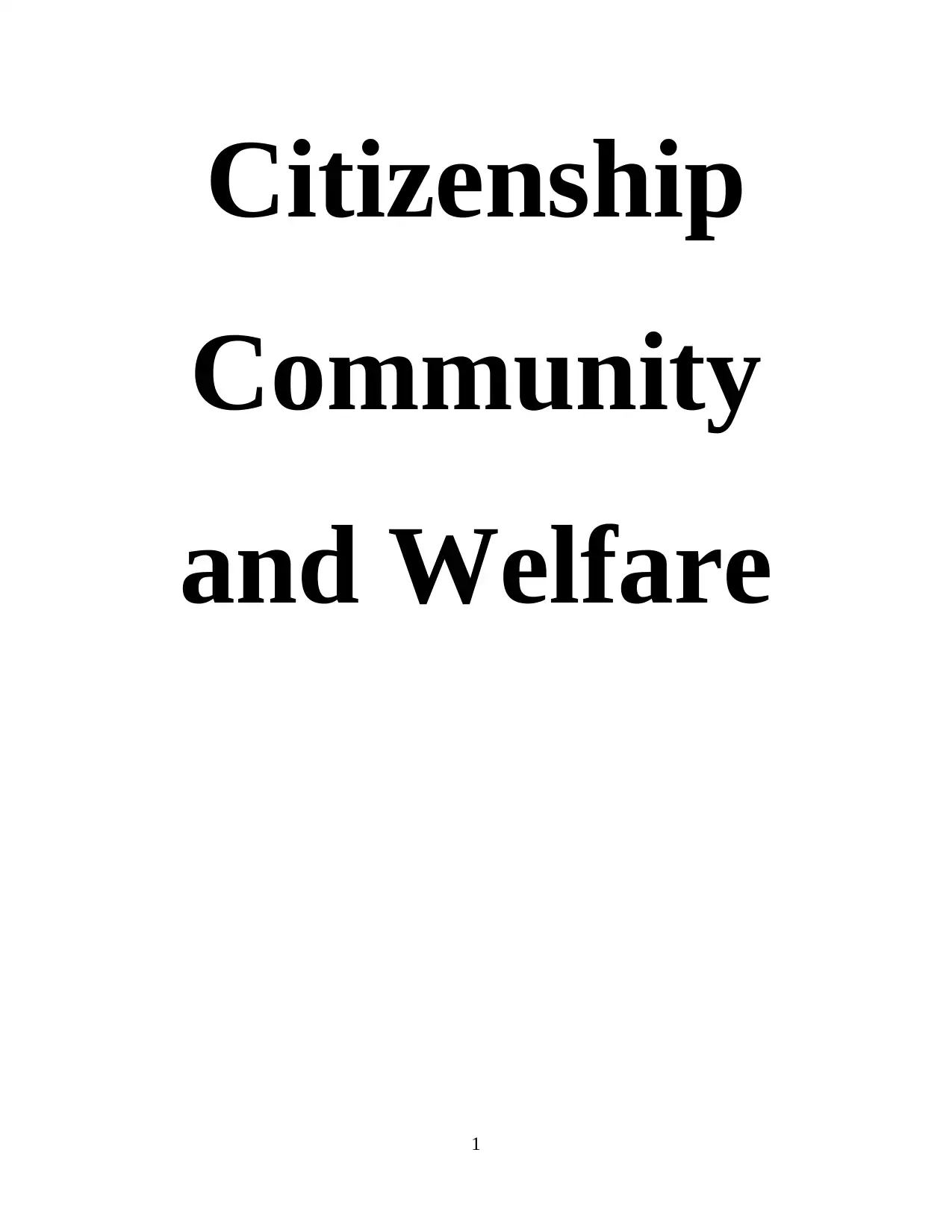
Citizenship
Community
and Welfare
1
Community
and Welfare
1
Paraphrase This Document
Need a fresh take? Get an instant paraphrase of this document with our AI Paraphraser
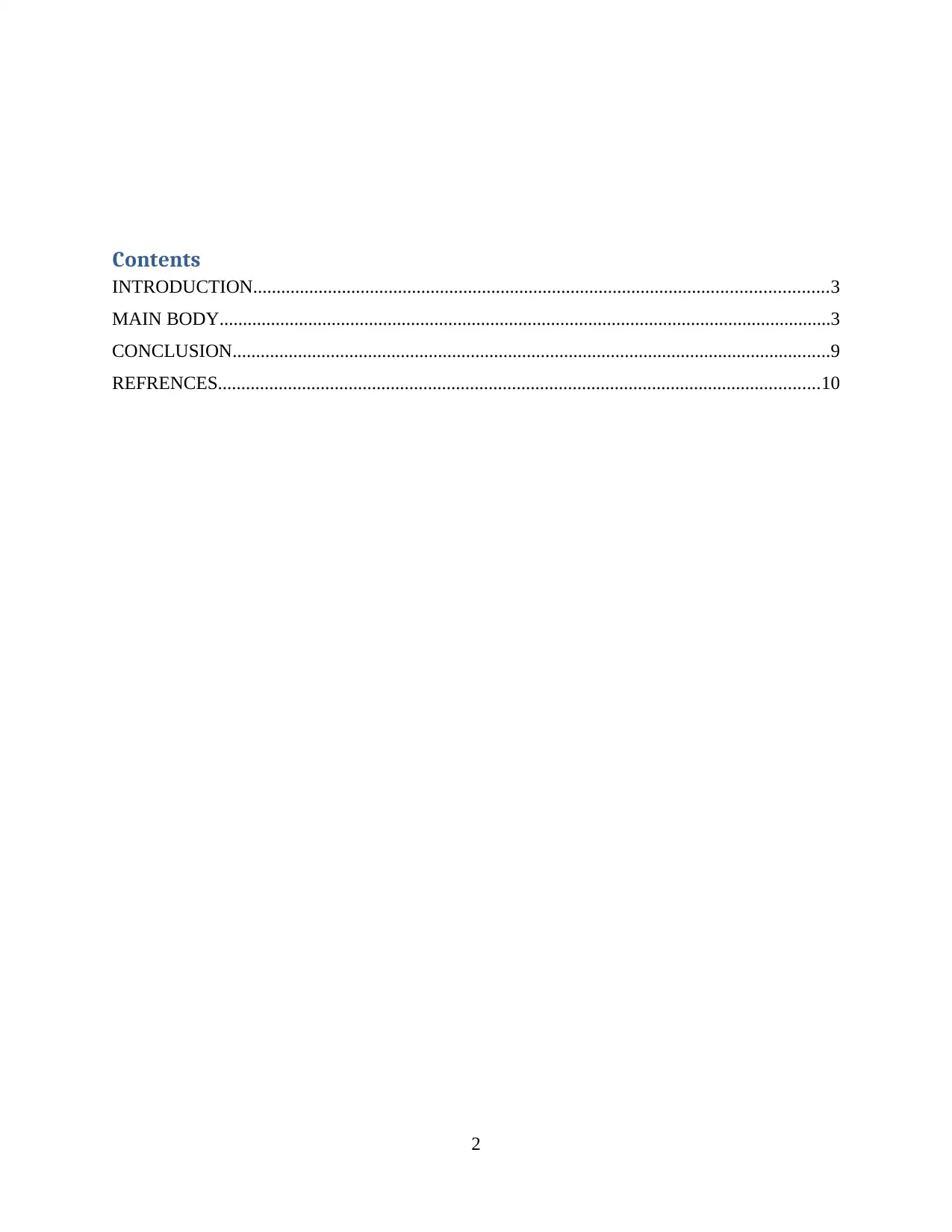
Contents
INTRODUCTION...........................................................................................................................3
MAIN BODY...................................................................................................................................3
CONCLUSION................................................................................................................................9
REFRENCES.................................................................................................................................10
2
INTRODUCTION...........................................................................................................................3
MAIN BODY...................................................................................................................................3
CONCLUSION................................................................................................................................9
REFRENCES.................................................................................................................................10
2
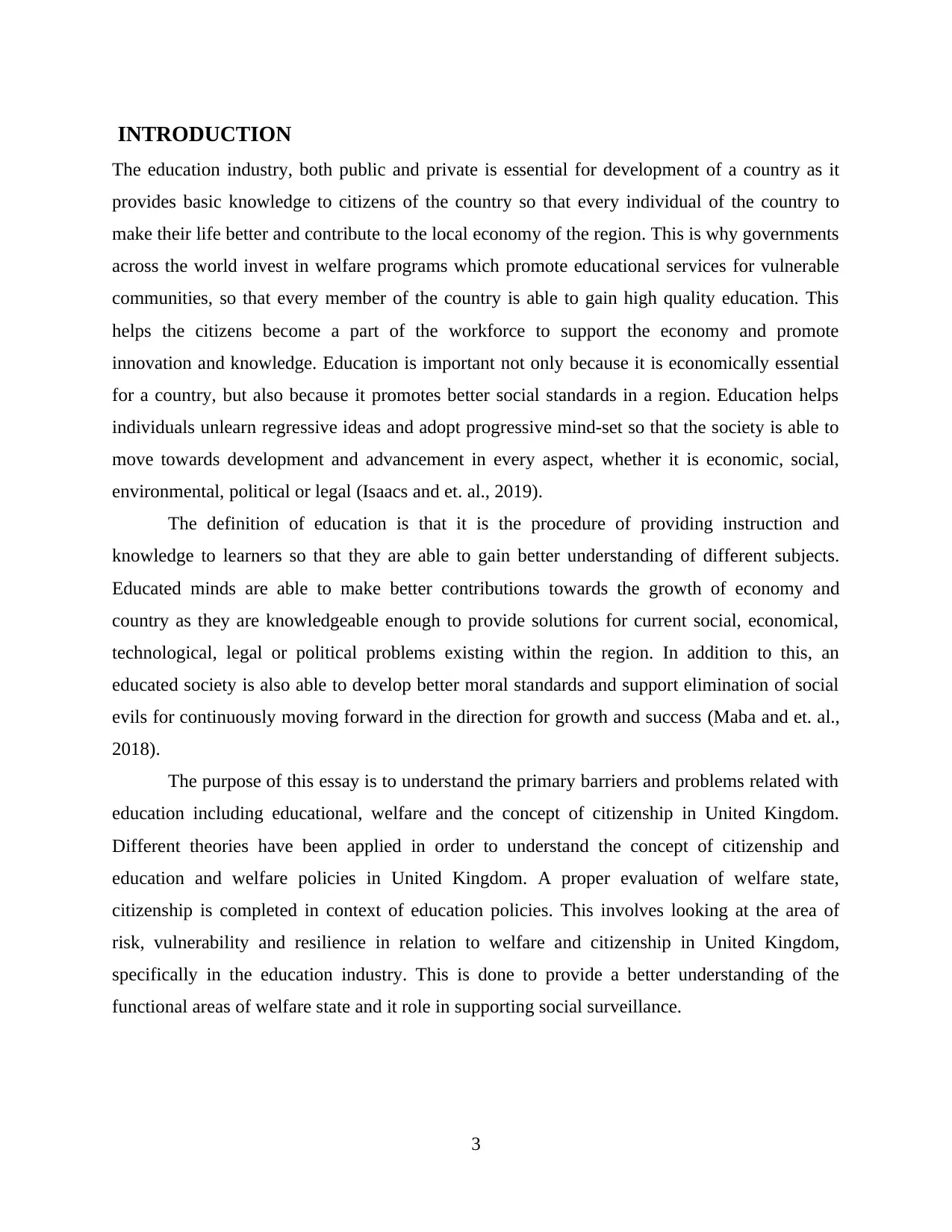
INTRODUCTION
The education industry, both public and private is essential for development of a country as it
provides basic knowledge to citizens of the country so that every individual of the country to
make their life better and contribute to the local economy of the region. This is why governments
across the world invest in welfare programs which promote educational services for vulnerable
communities, so that every member of the country is able to gain high quality education. This
helps the citizens become a part of the workforce to support the economy and promote
innovation and knowledge. Education is important not only because it is economically essential
for a country, but also because it promotes better social standards in a region. Education helps
individuals unlearn regressive ideas and adopt progressive mind-set so that the society is able to
move towards development and advancement in every aspect, whether it is economic, social,
environmental, political or legal (Isaacs and et. al., 2019).
The definition of education is that it is the procedure of providing instruction and
knowledge to learners so that they are able to gain better understanding of different subjects.
Educated minds are able to make better contributions towards the growth of economy and
country as they are knowledgeable enough to provide solutions for current social, economical,
technological, legal or political problems existing within the region. In addition to this, an
educated society is also able to develop better moral standards and support elimination of social
evils for continuously moving forward in the direction for growth and success (Maba and et. al.,
2018).
The purpose of this essay is to understand the primary barriers and problems related with
education including educational, welfare and the concept of citizenship in United Kingdom.
Different theories have been applied in order to understand the concept of citizenship and
education and welfare policies in United Kingdom. A proper evaluation of welfare state,
citizenship is completed in context of education policies. This involves looking at the area of
risk, vulnerability and resilience in relation to welfare and citizenship in United Kingdom,
specifically in the education industry. This is done to provide a better understanding of the
functional areas of welfare state and it role in supporting social surveillance.
3
The education industry, both public and private is essential for development of a country as it
provides basic knowledge to citizens of the country so that every individual of the country to
make their life better and contribute to the local economy of the region. This is why governments
across the world invest in welfare programs which promote educational services for vulnerable
communities, so that every member of the country is able to gain high quality education. This
helps the citizens become a part of the workforce to support the economy and promote
innovation and knowledge. Education is important not only because it is economically essential
for a country, but also because it promotes better social standards in a region. Education helps
individuals unlearn regressive ideas and adopt progressive mind-set so that the society is able to
move towards development and advancement in every aspect, whether it is economic, social,
environmental, political or legal (Isaacs and et. al., 2019).
The definition of education is that it is the procedure of providing instruction and
knowledge to learners so that they are able to gain better understanding of different subjects.
Educated minds are able to make better contributions towards the growth of economy and
country as they are knowledgeable enough to provide solutions for current social, economical,
technological, legal or political problems existing within the region. In addition to this, an
educated society is also able to develop better moral standards and support elimination of social
evils for continuously moving forward in the direction for growth and success (Maba and et. al.,
2018).
The purpose of this essay is to understand the primary barriers and problems related with
education including educational, welfare and the concept of citizenship in United Kingdom.
Different theories have been applied in order to understand the concept of citizenship and
education and welfare policies in United Kingdom. A proper evaluation of welfare state,
citizenship is completed in context of education policies. This involves looking at the area of
risk, vulnerability and resilience in relation to welfare and citizenship in United Kingdom,
specifically in the education industry. This is done to provide a better understanding of the
functional areas of welfare state and it role in supporting social surveillance.
3
⊘ This is a preview!⊘
Do you want full access?
Subscribe today to unlock all pages.

Trusted by 1+ million students worldwide
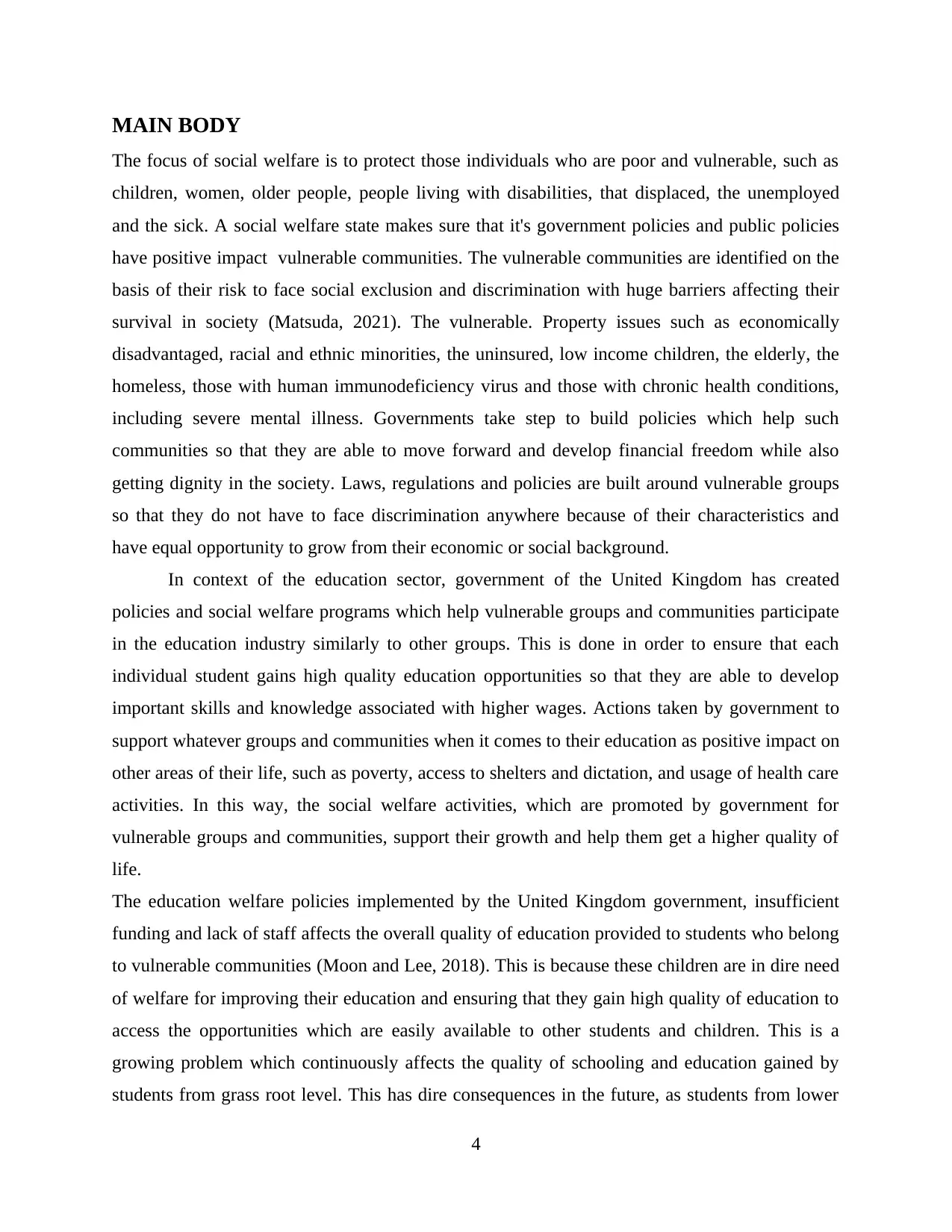
MAIN BODY
The focus of social welfare is to protect those individuals who are poor and vulnerable, such as
children, women, older people, people living with disabilities, that displaced, the unemployed
and the sick. A social welfare state makes sure that it's government policies and public policies
have positive impact vulnerable communities. The vulnerable communities are identified on the
basis of their risk to face social exclusion and discrimination with huge barriers affecting their
survival in society (Matsuda, 2021). The vulnerable. Property issues such as economically
disadvantaged, racial and ethnic minorities, the uninsured, low income children, the elderly, the
homeless, those with human immunodeficiency virus and those with chronic health conditions,
including severe mental illness. Governments take step to build policies which help such
communities so that they are able to move forward and develop financial freedom while also
getting dignity in the society. Laws, regulations and policies are built around vulnerable groups
so that they do not have to face discrimination anywhere because of their characteristics and
have equal opportunity to grow from their economic or social background.
In context of the education sector, government of the United Kingdom has created
policies and social welfare programs which help vulnerable groups and communities participate
in the education industry similarly to other groups. This is done in order to ensure that each
individual student gains high quality education opportunities so that they are able to develop
important skills and knowledge associated with higher wages. Actions taken by government to
support whatever groups and communities when it comes to their education as positive impact on
other areas of their life, such as poverty, access to shelters and dictation, and usage of health care
activities. In this way, the social welfare activities, which are promoted by government for
vulnerable groups and communities, support their growth and help them get a higher quality of
life.
The education welfare policies implemented by the United Kingdom government, insufficient
funding and lack of staff affects the overall quality of education provided to students who belong
to vulnerable communities (Moon and Lee, 2018). This is because these children are in dire need
of welfare for improving their education and ensuring that they gain high quality of education to
access the opportunities which are easily available to other students and children. This is a
growing problem which continuously affects the quality of schooling and education gained by
students from grass root level. This has dire consequences in the future, as students from lower
4
The focus of social welfare is to protect those individuals who are poor and vulnerable, such as
children, women, older people, people living with disabilities, that displaced, the unemployed
and the sick. A social welfare state makes sure that it's government policies and public policies
have positive impact vulnerable communities. The vulnerable communities are identified on the
basis of their risk to face social exclusion and discrimination with huge barriers affecting their
survival in society (Matsuda, 2021). The vulnerable. Property issues such as economically
disadvantaged, racial and ethnic minorities, the uninsured, low income children, the elderly, the
homeless, those with human immunodeficiency virus and those with chronic health conditions,
including severe mental illness. Governments take step to build policies which help such
communities so that they are able to move forward and develop financial freedom while also
getting dignity in the society. Laws, regulations and policies are built around vulnerable groups
so that they do not have to face discrimination anywhere because of their characteristics and
have equal opportunity to grow from their economic or social background.
In context of the education sector, government of the United Kingdom has created
policies and social welfare programs which help vulnerable groups and communities participate
in the education industry similarly to other groups. This is done in order to ensure that each
individual student gains high quality education opportunities so that they are able to develop
important skills and knowledge associated with higher wages. Actions taken by government to
support whatever groups and communities when it comes to their education as positive impact on
other areas of their life, such as poverty, access to shelters and dictation, and usage of health care
activities. In this way, the social welfare activities, which are promoted by government for
vulnerable groups and communities, support their growth and help them get a higher quality of
life.
The education welfare policies implemented by the United Kingdom government, insufficient
funding and lack of staff affects the overall quality of education provided to students who belong
to vulnerable communities (Moon and Lee, 2018). This is because these children are in dire need
of welfare for improving their education and ensuring that they gain high quality of education to
access the opportunities which are easily available to other students and children. This is a
growing problem which continuously affects the quality of schooling and education gained by
students from grass root level. This has dire consequences in the future, as students from lower
4
Paraphrase This Document
Need a fresh take? Get an instant paraphrase of this document with our AI Paraphraser
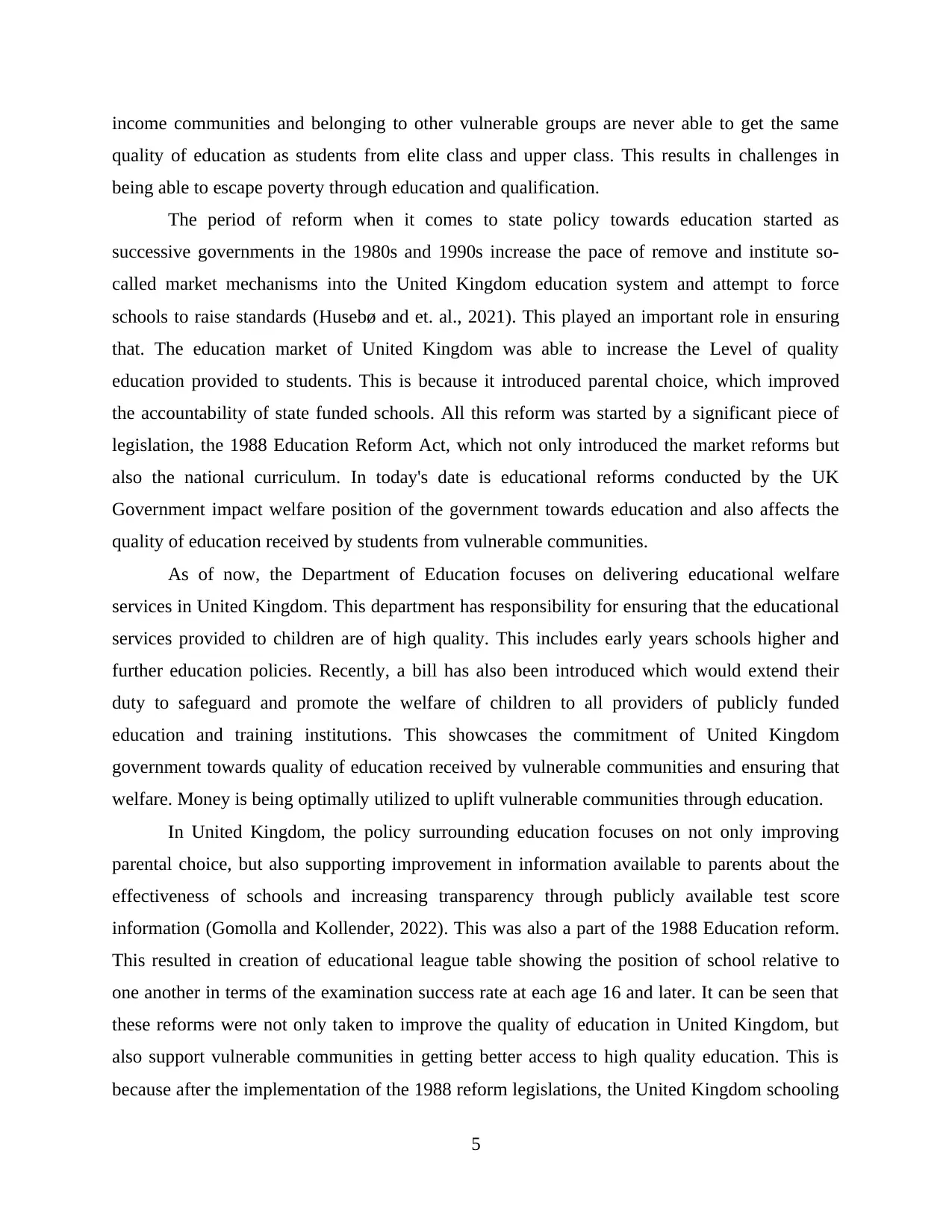
income communities and belonging to other vulnerable groups are never able to get the same
quality of education as students from elite class and upper class. This results in challenges in
being able to escape poverty through education and qualification.
The period of reform when it comes to state policy towards education started as
successive governments in the 1980s and 1990s increase the pace of remove and institute so-
called market mechanisms into the United Kingdom education system and attempt to force
schools to raise standards (Husebø and et. al., 2021). This played an important role in ensuring
that. The education market of United Kingdom was able to increase the Level of quality
education provided to students. This is because it introduced parental choice, which improved
the accountability of state funded schools. All this reform was started by a significant piece of
legislation, the 1988 Education Reform Act, which not only introduced the market reforms but
also the national curriculum. In today's date is educational reforms conducted by the UK
Government impact welfare position of the government towards education and also affects the
quality of education received by students from vulnerable communities.
As of now, the Department of Education focuses on delivering educational welfare
services in United Kingdom. This department has responsibility for ensuring that the educational
services provided to children are of high quality. This includes early years schools higher and
further education policies. Recently, a bill has also been introduced which would extend their
duty to safeguard and promote the welfare of children to all providers of publicly funded
education and training institutions. This showcases the commitment of United Kingdom
government towards quality of education received by vulnerable communities and ensuring that
welfare. Money is being optimally utilized to uplift vulnerable communities through education.
In United Kingdom, the policy surrounding education focuses on not only improving
parental choice, but also supporting improvement in information available to parents about the
effectiveness of schools and increasing transparency through publicly available test score
information (Gomolla and Kollender, 2022). This was also a part of the 1988 Education reform.
This resulted in creation of educational league table showing the position of school relative to
one another in terms of the examination success rate at each age 16 and later. It can be seen that
these reforms were not only taken to improve the quality of education in United Kingdom, but
also support vulnerable communities in getting better access to high quality education. This is
because after the implementation of the 1988 reform legislations, the United Kingdom schooling
5
quality of education as students from elite class and upper class. This results in challenges in
being able to escape poverty through education and qualification.
The period of reform when it comes to state policy towards education started as
successive governments in the 1980s and 1990s increase the pace of remove and institute so-
called market mechanisms into the United Kingdom education system and attempt to force
schools to raise standards (Husebø and et. al., 2021). This played an important role in ensuring
that. The education market of United Kingdom was able to increase the Level of quality
education provided to students. This is because it introduced parental choice, which improved
the accountability of state funded schools. All this reform was started by a significant piece of
legislation, the 1988 Education Reform Act, which not only introduced the market reforms but
also the national curriculum. In today's date is educational reforms conducted by the UK
Government impact welfare position of the government towards education and also affects the
quality of education received by students from vulnerable communities.
As of now, the Department of Education focuses on delivering educational welfare
services in United Kingdom. This department has responsibility for ensuring that the educational
services provided to children are of high quality. This includes early years schools higher and
further education policies. Recently, a bill has also been introduced which would extend their
duty to safeguard and promote the welfare of children to all providers of publicly funded
education and training institutions. This showcases the commitment of United Kingdom
government towards quality of education received by vulnerable communities and ensuring that
welfare. Money is being optimally utilized to uplift vulnerable communities through education.
In United Kingdom, the policy surrounding education focuses on not only improving
parental choice, but also supporting improvement in information available to parents about the
effectiveness of schools and increasing transparency through publicly available test score
information (Gomolla and Kollender, 2022). This was also a part of the 1988 Education reform.
This resulted in creation of educational league table showing the position of school relative to
one another in terms of the examination success rate at each age 16 and later. It can be seen that
these reforms were not only taken to improve the quality of education in United Kingdom, but
also support vulnerable communities in getting better access to high quality education. This is
because after the implementation of the 1988 reform legislations, the United Kingdom schooling
5
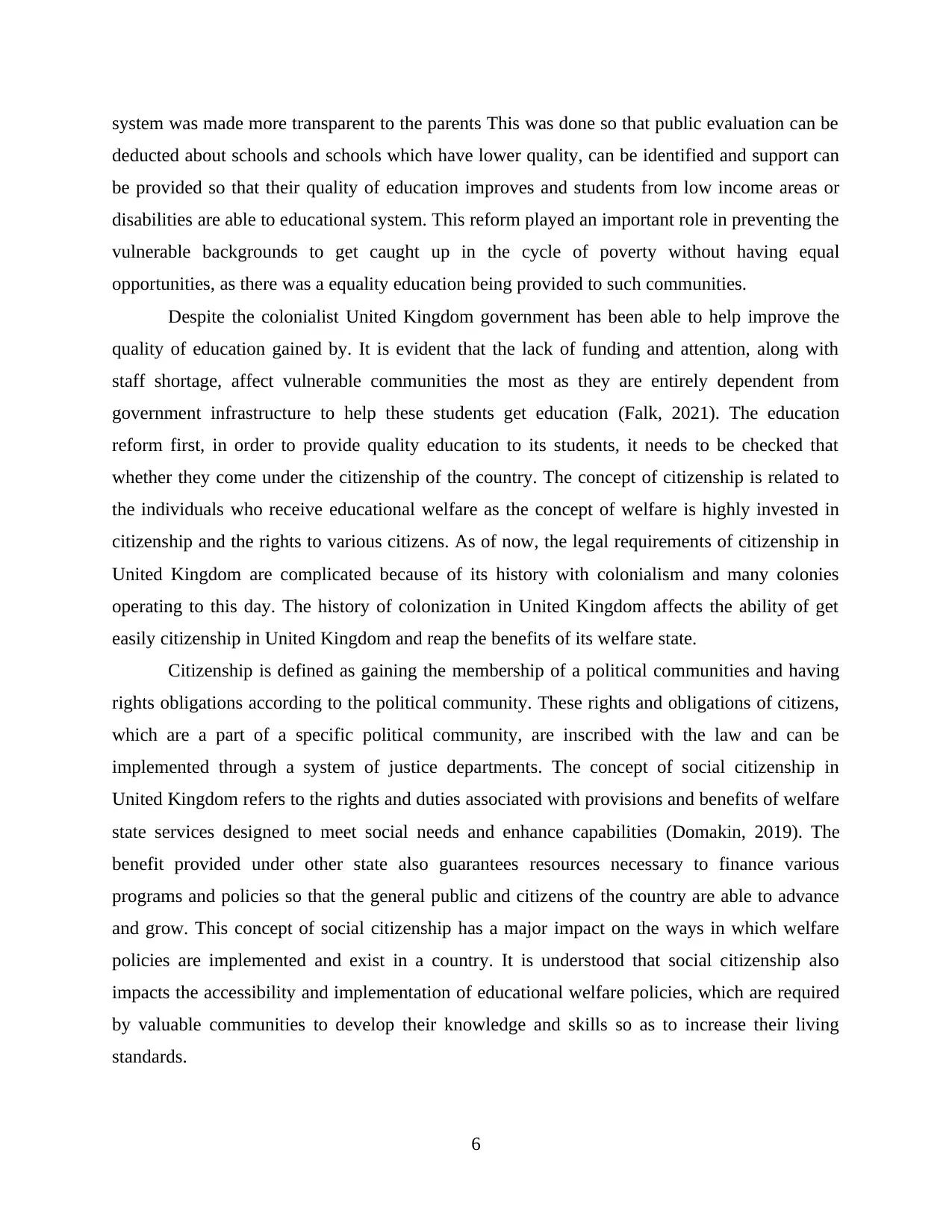
system was made more transparent to the parents This was done so that public evaluation can be
deducted about schools and schools which have lower quality, can be identified and support can
be provided so that their quality of education improves and students from low income areas or
disabilities are able to educational system. This reform played an important role in preventing the
vulnerable backgrounds to get caught up in the cycle of poverty without having equal
opportunities, as there was a equality education being provided to such communities.
Despite the colonialist United Kingdom government has been able to help improve the
quality of education gained by. It is evident that the lack of funding and attention, along with
staff shortage, affect vulnerable communities the most as they are entirely dependent from
government infrastructure to help these students get education (Falk, 2021). The education
reform first, in order to provide quality education to its students, it needs to be checked that
whether they come under the citizenship of the country. The concept of citizenship is related to
the individuals who receive educational welfare as the concept of welfare is highly invested in
citizenship and the rights to various citizens. As of now, the legal requirements of citizenship in
United Kingdom are complicated because of its history with colonialism and many colonies
operating to this day. The history of colonization in United Kingdom affects the ability of get
easily citizenship in United Kingdom and reap the benefits of its welfare state.
Citizenship is defined as gaining the membership of a political communities and having
rights obligations according to the political community. These rights and obligations of citizens,
which are a part of a specific political community, are inscribed with the law and can be
implemented through a system of justice departments. The concept of social citizenship in
United Kingdom refers to the rights and duties associated with provisions and benefits of welfare
state services designed to meet social needs and enhance capabilities (Domakin, 2019). The
benefit provided under other state also guarantees resources necessary to finance various
programs and policies so that the general public and citizens of the country are able to advance
and grow. This concept of social citizenship has a major impact on the ways in which welfare
policies are implemented and exist in a country. It is understood that social citizenship also
impacts the accessibility and implementation of educational welfare policies, which are required
by valuable communities to develop their knowledge and skills so as to increase their living
standards.
6
deducted about schools and schools which have lower quality, can be identified and support can
be provided so that their quality of education improves and students from low income areas or
disabilities are able to educational system. This reform played an important role in preventing the
vulnerable backgrounds to get caught up in the cycle of poverty without having equal
opportunities, as there was a equality education being provided to such communities.
Despite the colonialist United Kingdom government has been able to help improve the
quality of education gained by. It is evident that the lack of funding and attention, along with
staff shortage, affect vulnerable communities the most as they are entirely dependent from
government infrastructure to help these students get education (Falk, 2021). The education
reform first, in order to provide quality education to its students, it needs to be checked that
whether they come under the citizenship of the country. The concept of citizenship is related to
the individuals who receive educational welfare as the concept of welfare is highly invested in
citizenship and the rights to various citizens. As of now, the legal requirements of citizenship in
United Kingdom are complicated because of its history with colonialism and many colonies
operating to this day. The history of colonization in United Kingdom affects the ability of get
easily citizenship in United Kingdom and reap the benefits of its welfare state.
Citizenship is defined as gaining the membership of a political communities and having
rights obligations according to the political community. These rights and obligations of citizens,
which are a part of a specific political community, are inscribed with the law and can be
implemented through a system of justice departments. The concept of social citizenship in
United Kingdom refers to the rights and duties associated with provisions and benefits of welfare
state services designed to meet social needs and enhance capabilities (Domakin, 2019). The
benefit provided under other state also guarantees resources necessary to finance various
programs and policies so that the general public and citizens of the country are able to advance
and grow. This concept of social citizenship has a major impact on the ways in which welfare
policies are implemented and exist in a country. It is understood that social citizenship also
impacts the accessibility and implementation of educational welfare policies, which are required
by valuable communities to develop their knowledge and skills so as to increase their living
standards.
6
⊘ This is a preview!⊘
Do you want full access?
Subscribe today to unlock all pages.

Trusted by 1+ million students worldwide
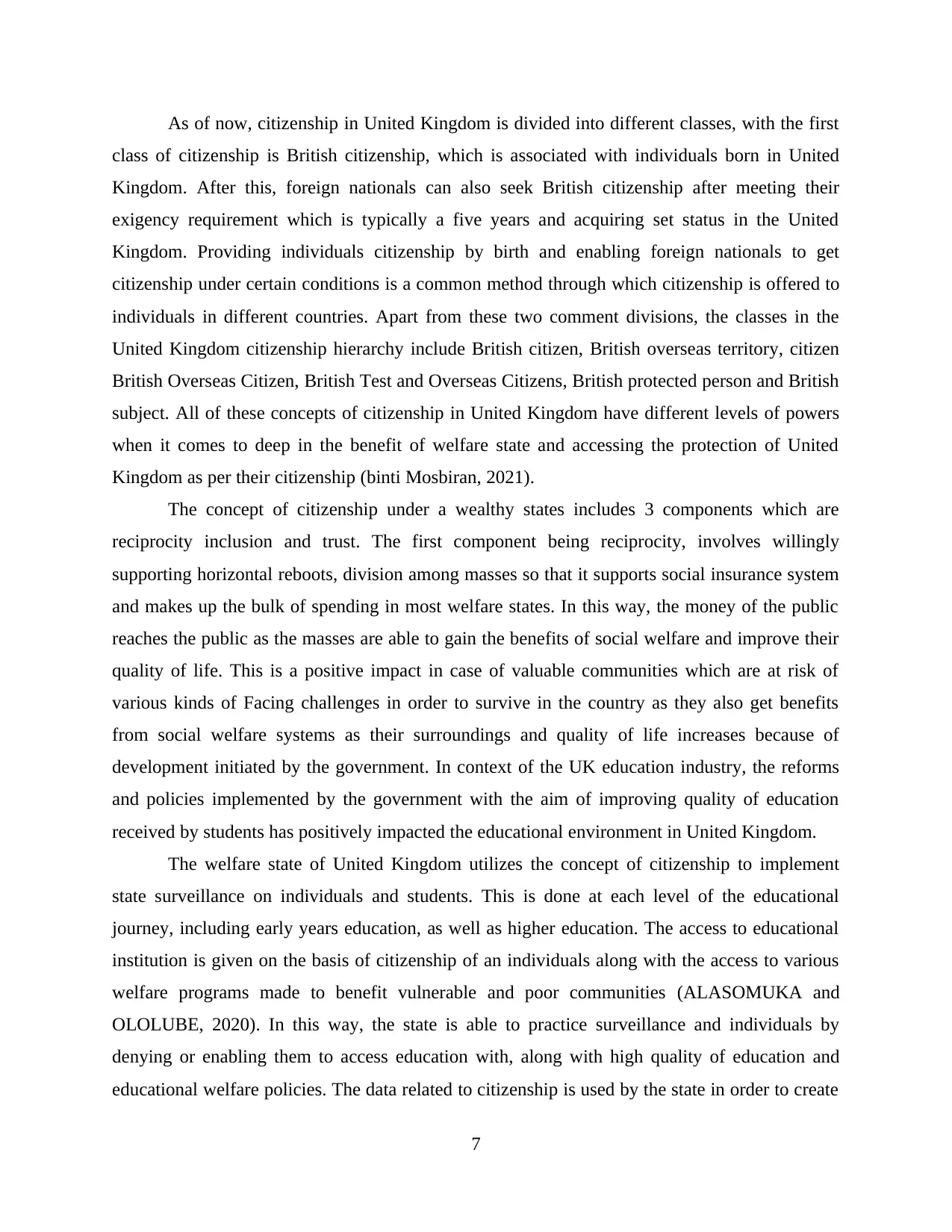
As of now, citizenship in United Kingdom is divided into different classes, with the first
class of citizenship is British citizenship, which is associated with individuals born in United
Kingdom. After this, foreign nationals can also seek British citizenship after meeting their
exigency requirement which is typically a five years and acquiring set status in the United
Kingdom. Providing individuals citizenship by birth and enabling foreign nationals to get
citizenship under certain conditions is a common method through which citizenship is offered to
individuals in different countries. Apart from these two comment divisions, the classes in the
United Kingdom citizenship hierarchy include British citizen, British overseas territory, citizen
British Overseas Citizen, British Test and Overseas Citizens, British protected person and British
subject. All of these concepts of citizenship in United Kingdom have different levels of powers
when it comes to deep in the benefit of welfare state and accessing the protection of United
Kingdom as per their citizenship (binti Mosbiran, 2021).
The concept of citizenship under a wealthy states includes 3 components which are
reciprocity inclusion and trust. The first component being reciprocity, involves willingly
supporting horizontal reboots, division among masses so that it supports social insurance system
and makes up the bulk of spending in most welfare states. In this way, the money of the public
reaches the public as the masses are able to gain the benefits of social welfare and improve their
quality of life. This is a positive impact in case of valuable communities which are at risk of
various kinds of Facing challenges in order to survive in the country as they also get benefits
from social welfare systems as their surroundings and quality of life increases because of
development initiated by the government. In context of the UK education industry, the reforms
and policies implemented by the government with the aim of improving quality of education
received by students has positively impacted the educational environment in United Kingdom.
The welfare state of United Kingdom utilizes the concept of citizenship to implement
state surveillance on individuals and students. This is done at each level of the educational
journey, including early years education, as well as higher education. The access to educational
institution is given on the basis of citizenship of an individuals along with the access to various
welfare programs made to benefit vulnerable and poor communities (ALASOMUKA and
OLOLUBE, 2020). In this way, the state is able to practice surveillance and individuals by
denying or enabling them to access education with, along with high quality of education and
educational welfare policies. The data related to citizenship is used by the state in order to create
7
class of citizenship is British citizenship, which is associated with individuals born in United
Kingdom. After this, foreign nationals can also seek British citizenship after meeting their
exigency requirement which is typically a five years and acquiring set status in the United
Kingdom. Providing individuals citizenship by birth and enabling foreign nationals to get
citizenship under certain conditions is a common method through which citizenship is offered to
individuals in different countries. Apart from these two comment divisions, the classes in the
United Kingdom citizenship hierarchy include British citizen, British overseas territory, citizen
British Overseas Citizen, British Test and Overseas Citizens, British protected person and British
subject. All of these concepts of citizenship in United Kingdom have different levels of powers
when it comes to deep in the benefit of welfare state and accessing the protection of United
Kingdom as per their citizenship (binti Mosbiran, 2021).
The concept of citizenship under a wealthy states includes 3 components which are
reciprocity inclusion and trust. The first component being reciprocity, involves willingly
supporting horizontal reboots, division among masses so that it supports social insurance system
and makes up the bulk of spending in most welfare states. In this way, the money of the public
reaches the public as the masses are able to gain the benefits of social welfare and improve their
quality of life. This is a positive impact in case of valuable communities which are at risk of
various kinds of Facing challenges in order to survive in the country as they also get benefits
from social welfare systems as their surroundings and quality of life increases because of
development initiated by the government. In context of the UK education industry, the reforms
and policies implemented by the government with the aim of improving quality of education
received by students has positively impacted the educational environment in United Kingdom.
The welfare state of United Kingdom utilizes the concept of citizenship to implement
state surveillance on individuals and students. This is done at each level of the educational
journey, including early years education, as well as higher education. The access to educational
institution is given on the basis of citizenship of an individuals along with the access to various
welfare programs made to benefit vulnerable and poor communities (ALASOMUKA and
OLOLUBE, 2020). In this way, the state is able to practice surveillance and individuals by
denying or enabling them to access education with, along with high quality of education and
educational welfare policies. The data related to citizenship is used by the state in order to create
7
Paraphrase This Document
Need a fresh take? Get an instant paraphrase of this document with our AI Paraphraser
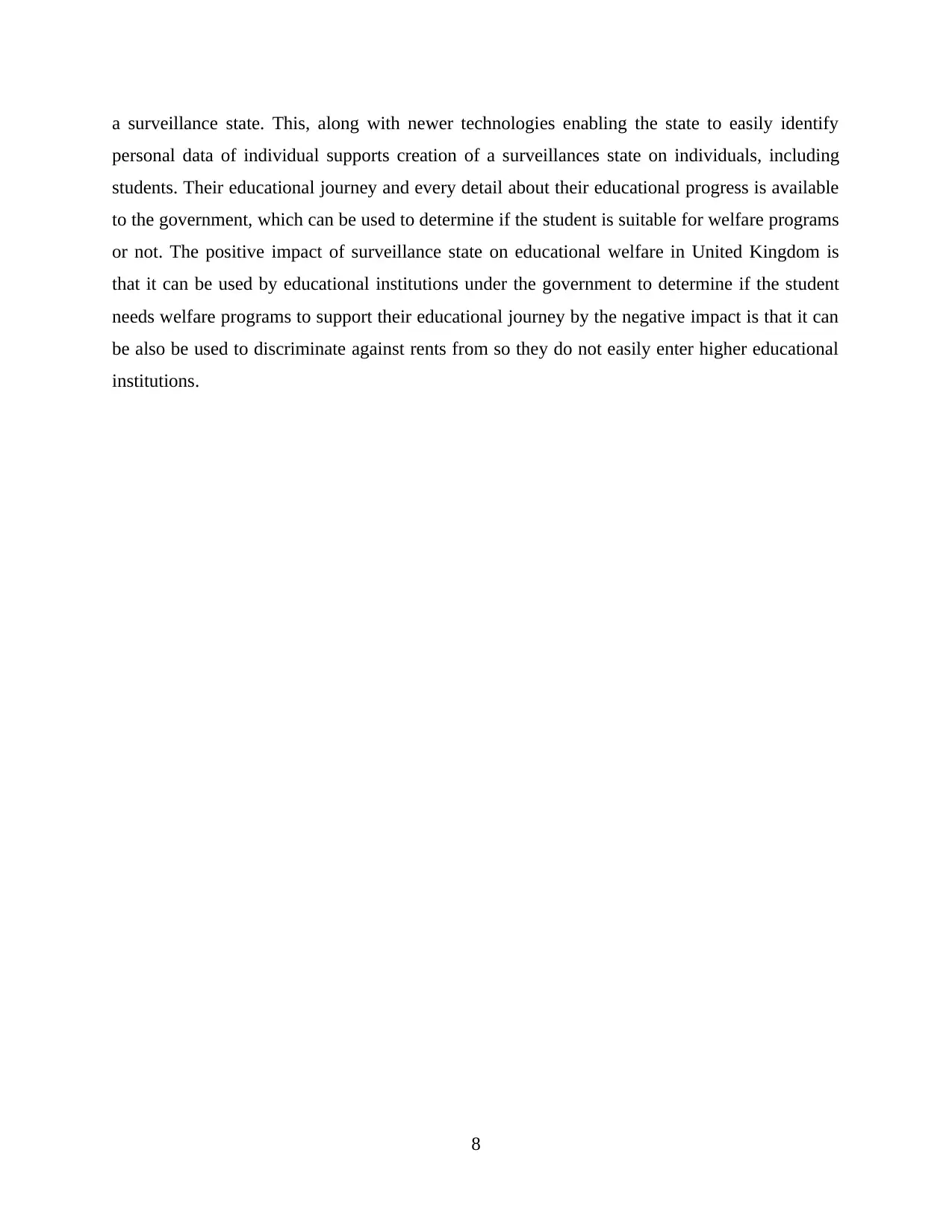
a surveillance state. This, along with newer technologies enabling the state to easily identify
personal data of individual supports creation of a surveillances state on individuals, including
students. Their educational journey and every detail about their educational progress is available
to the government, which can be used to determine if the student is suitable for welfare programs
or not. The positive impact of surveillance state on educational welfare in United Kingdom is
that it can be used by educational institutions under the government to determine if the student
needs welfare programs to support their educational journey by the negative impact is that it can
be also be used to discriminate against rents from so they do not easily enter higher educational
institutions.
8
personal data of individual supports creation of a surveillances state on individuals, including
students. Their educational journey and every detail about their educational progress is available
to the government, which can be used to determine if the student is suitable for welfare programs
or not. The positive impact of surveillance state on educational welfare in United Kingdom is
that it can be used by educational institutions under the government to determine if the student
needs welfare programs to support their educational journey by the negative impact is that it can
be also be used to discriminate against rents from so they do not easily enter higher educational
institutions.
8
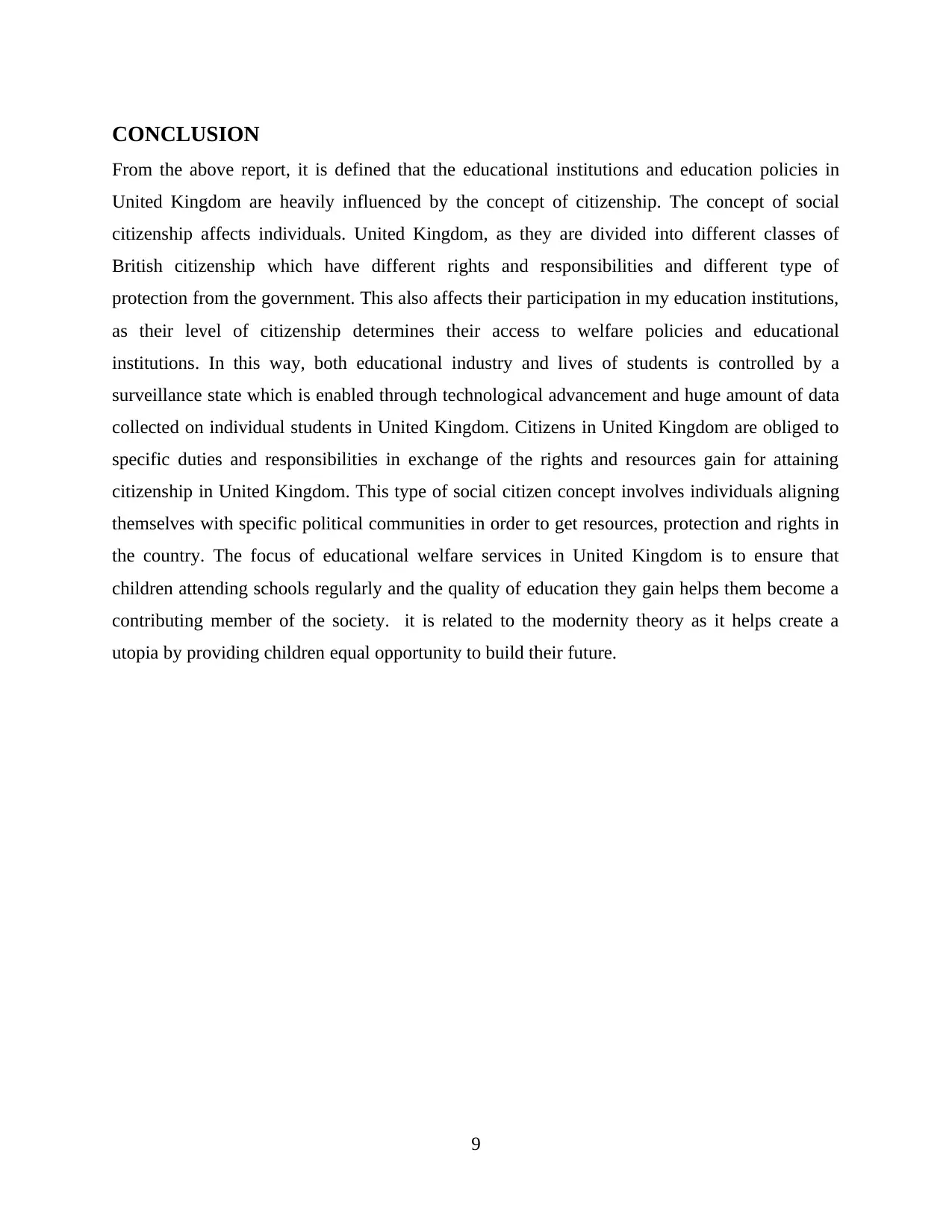
CONCLUSION
From the above report, it is defined that the educational institutions and education policies in
United Kingdom are heavily influenced by the concept of citizenship. The concept of social
citizenship affects individuals. United Kingdom, as they are divided into different classes of
British citizenship which have different rights and responsibilities and different type of
protection from the government. This also affects their participation in my education institutions,
as their level of citizenship determines their access to welfare policies and educational
institutions. In this way, both educational industry and lives of students is controlled by a
surveillance state which is enabled through technological advancement and huge amount of data
collected on individual students in United Kingdom. Citizens in United Kingdom are obliged to
specific duties and responsibilities in exchange of the rights and resources gain for attaining
citizenship in United Kingdom. This type of social citizen concept involves individuals aligning
themselves with specific political communities in order to get resources, protection and rights in
the country. The focus of educational welfare services in United Kingdom is to ensure that
children attending schools regularly and the quality of education they gain helps them become a
contributing member of the society. it is related to the modernity theory as it helps create a
utopia by providing children equal opportunity to build their future.
9
From the above report, it is defined that the educational institutions and education policies in
United Kingdom are heavily influenced by the concept of citizenship. The concept of social
citizenship affects individuals. United Kingdom, as they are divided into different classes of
British citizenship which have different rights and responsibilities and different type of
protection from the government. This also affects their participation in my education institutions,
as their level of citizenship determines their access to welfare policies and educational
institutions. In this way, both educational industry and lives of students is controlled by a
surveillance state which is enabled through technological advancement and huge amount of data
collected on individual students in United Kingdom. Citizens in United Kingdom are obliged to
specific duties and responsibilities in exchange of the rights and resources gain for attaining
citizenship in United Kingdom. This type of social citizen concept involves individuals aligning
themselves with specific political communities in order to get resources, protection and rights in
the country. The focus of educational welfare services in United Kingdom is to ensure that
children attending schools regularly and the quality of education they gain helps them become a
contributing member of the society. it is related to the modernity theory as it helps create a
utopia by providing children equal opportunity to build their future.
9
⊘ This is a preview!⊘
Do you want full access?
Subscribe today to unlock all pages.

Trusted by 1+ million students worldwide
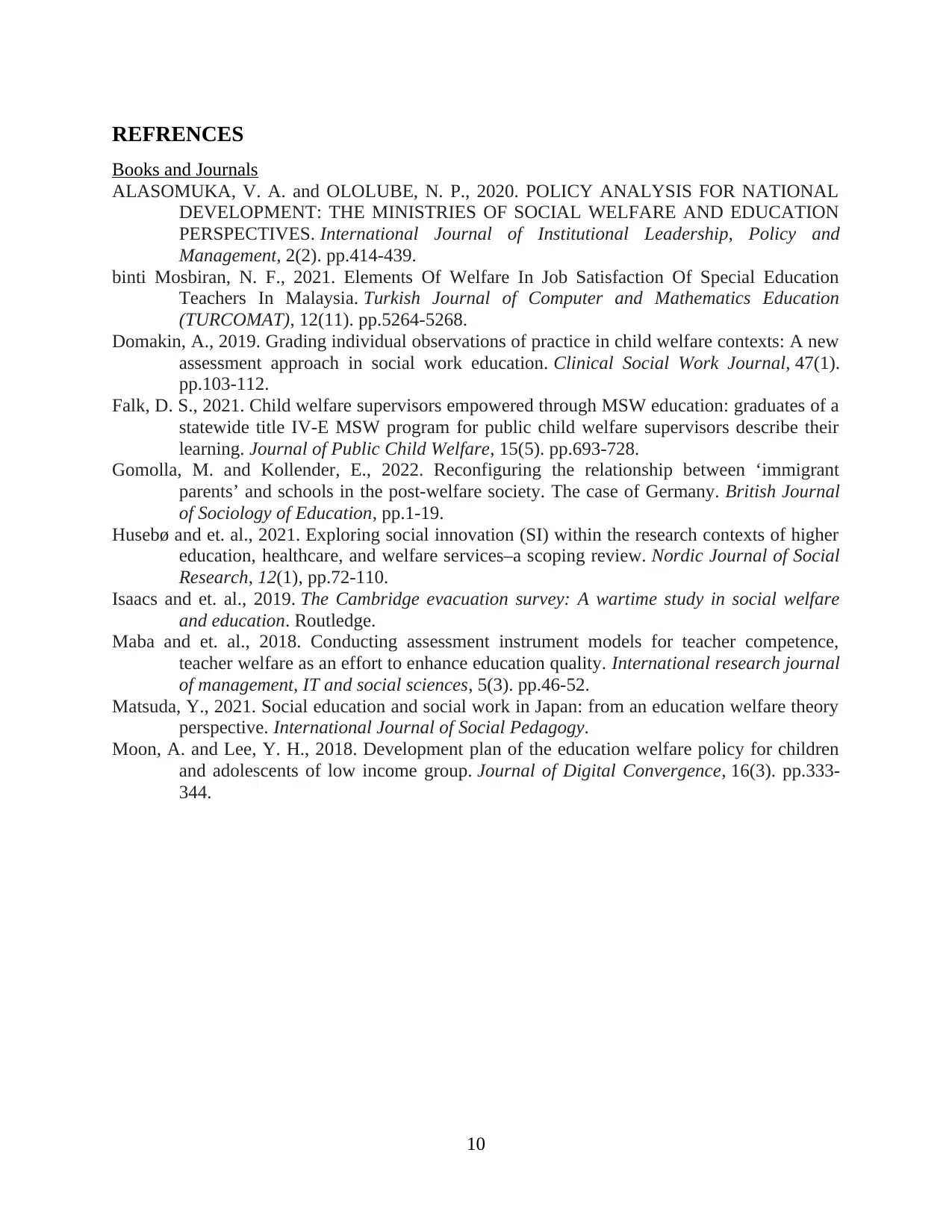
REFRENCES
Books and Journals
ALASOMUKA, V. A. and OLOLUBE, N. P., 2020. POLICY ANALYSIS FOR NATIONAL
DEVELOPMENT: THE MINISTRIES OF SOCIAL WELFARE AND EDUCATION
PERSPECTIVES. International Journal of Institutional Leadership, Policy and
Management, 2(2). pp.414-439.
binti Mosbiran, N. F., 2021. Elements Of Welfare In Job Satisfaction Of Special Education
Teachers In Malaysia. Turkish Journal of Computer and Mathematics Education
(TURCOMAT), 12(11). pp.5264-5268.
Domakin, A., 2019. Grading individual observations of practice in child welfare contexts: A new
assessment approach in social work education. Clinical Social Work Journal, 47(1).
pp.103-112.
Falk, D. S., 2021. Child welfare supervisors empowered through MSW education: graduates of a
statewide title IV-E MSW program for public child welfare supervisors describe their
learning. Journal of Public Child Welfare, 15(5). pp.693-728.
Gomolla, M. and Kollender, E., 2022. Reconfiguring the relationship between ‘immigrant
parents’ and schools in the post-welfare society. The case of Germany. British Journal
of Sociology of Education, pp.1-19.
Husebø and et. al., 2021. Exploring social innovation (SI) within the research contexts of higher
education, healthcare, and welfare services–a scoping review. Nordic Journal of Social
Research, 12(1), pp.72-110.
Isaacs and et. al., 2019. The Cambridge evacuation survey: A wartime study in social welfare
and education. Routledge.
Maba and et. al., 2018. Conducting assessment instrument models for teacher competence,
teacher welfare as an effort to enhance education quality. International research journal
of management, IT and social sciences, 5(3). pp.46-52.
Matsuda, Y., 2021. Social education and social work in Japan: from an education welfare theory
perspective. International Journal of Social Pedagogy.
Moon, A. and Lee, Y. H., 2018. Development plan of the education welfare policy for children
and adolescents of low income group. Journal of Digital Convergence, 16(3). pp.333-
344.
10
Books and Journals
ALASOMUKA, V. A. and OLOLUBE, N. P., 2020. POLICY ANALYSIS FOR NATIONAL
DEVELOPMENT: THE MINISTRIES OF SOCIAL WELFARE AND EDUCATION
PERSPECTIVES. International Journal of Institutional Leadership, Policy and
Management, 2(2). pp.414-439.
binti Mosbiran, N. F., 2021. Elements Of Welfare In Job Satisfaction Of Special Education
Teachers In Malaysia. Turkish Journal of Computer and Mathematics Education
(TURCOMAT), 12(11). pp.5264-5268.
Domakin, A., 2019. Grading individual observations of practice in child welfare contexts: A new
assessment approach in social work education. Clinical Social Work Journal, 47(1).
pp.103-112.
Falk, D. S., 2021. Child welfare supervisors empowered through MSW education: graduates of a
statewide title IV-E MSW program for public child welfare supervisors describe their
learning. Journal of Public Child Welfare, 15(5). pp.693-728.
Gomolla, M. and Kollender, E., 2022. Reconfiguring the relationship between ‘immigrant
parents’ and schools in the post-welfare society. The case of Germany. British Journal
of Sociology of Education, pp.1-19.
Husebø and et. al., 2021. Exploring social innovation (SI) within the research contexts of higher
education, healthcare, and welfare services–a scoping review. Nordic Journal of Social
Research, 12(1), pp.72-110.
Isaacs and et. al., 2019. The Cambridge evacuation survey: A wartime study in social welfare
and education. Routledge.
Maba and et. al., 2018. Conducting assessment instrument models for teacher competence,
teacher welfare as an effort to enhance education quality. International research journal
of management, IT and social sciences, 5(3). pp.46-52.
Matsuda, Y., 2021. Social education and social work in Japan: from an education welfare theory
perspective. International Journal of Social Pedagogy.
Moon, A. and Lee, Y. H., 2018. Development plan of the education welfare policy for children
and adolescents of low income group. Journal of Digital Convergence, 16(3). pp.333-
344.
10
1 out of 10
Related Documents
Your All-in-One AI-Powered Toolkit for Academic Success.
+13062052269
info@desklib.com
Available 24*7 on WhatsApp / Email
![[object Object]](/_next/static/media/star-bottom.7253800d.svg)
Unlock your academic potential
Copyright © 2020–2025 A2Z Services. All Rights Reserved. Developed and managed by ZUCOL.




